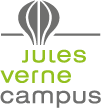Dreams Along the Journey
Anniversary Lecture Series at Jules Verne Campus (click here for poster)
3. Dare to do what you dream. But for that you need sleep.
Tuesday, April 16, 2024 at 7:00 pm in the Oasis (in German)
Our youth is bright but tired: We need a healthy sleep culture
Christoph Bornhauser, SBW House of Learning & Sabine Kötting, Jules Verne Campus
We are currently seeing a disturbing increase in concentration difficulties and mental health problems among children and young people. It is becoming increasingly clear that lack of sleep and poor sleep quality are partly responsible for this. In the first part of the lecture, Christoph Bornhauser will use scientific principles to explain the immense importance of sleep for our learning and health. In the second part of the lecture, Sabine Kötting will give concrete tips on how we can better fall asleep, sleep through the night, and wake up with the help of proven neuroscience-based exercises and methods derived from thousands of years of Ayurvedic medicine. It is of great concern to both speakers that children and young people at JVC develop a healthy sleep culture, one that optimally supports their physical and mental health and ability to learn. A rested mind and body are keys to successful personality development.
Christoph Bornhauser studied biology in Zurich and graduated with a diploma as a grammar school teacher. During his studies he was fascinated by neurobiology and in particular by the learning processes of the human brain. Since then, he has been pursuing research into our most complicated organ. Up until July 2020, he led the SBW Idea development department and, as an experienced educator, has been implementing the findings of neurobiology in the pedagogical concepts of the SBW House of Learning for over 40 years.
Sabine Kötting has been bringing her expert knowledge of neuroscience and psychology into schools for more than 12 years: she has developed a program to promote concentration, relaxation and resilience that provides children, young people and educators with easy-to-learn techniques. These techniques can be used independently, allowing each person to find individual balance. "The enthusiastic feedback I receive from learning partners and teaching colleagues about how the exercises improve learning, exam situations, classroom and family coexistence, sleep quality and energy management motivates me to constantly develop and carry the program forward in line with the latest scientific findings!"
Anniversary Lecture Series
1. Bilingualism from an Early Age: How to Reap the Benefits of Bilingualism
2. Living with Artificial Intelligence: The Potential of AI for the Future



